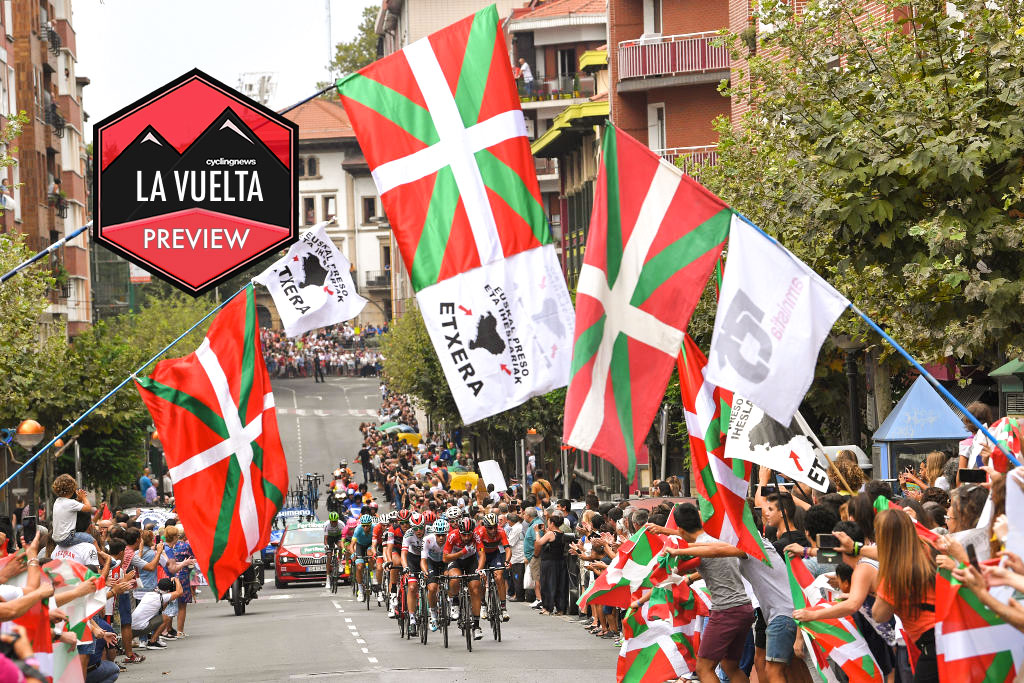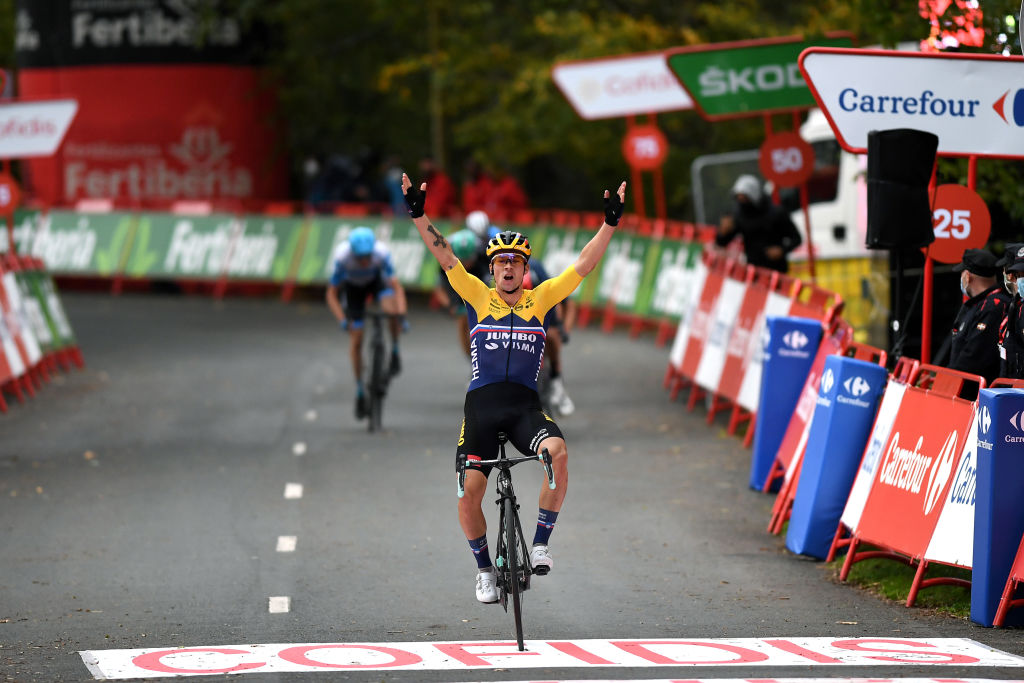Bandit country: What the Basque stages holds in store for the Vuelta a España
Alaphilippe and other Classics specialists likely to shine on hilly stages 4 and 5

After three days in the flatlands of Holland, the Vuelta a España returns to much more familiar territory on Tuesday with two extremely technical, hilly stages in the Basque Country. The stages will begin a radically different kind of racing where, as Remco Evenepoel recently put it, "the real Vuelta" will begin.
Most of the Vuelta peloton are familiar with the Basque Country's rabbit warren of rural backroads, crisscrossed by narrow, sinuous climbs and equally difficult descents.
Quite apart from the Vuelta's recent venture into the Euskadi 'cycling labyrinth' in 2020, other annual events like Itzulia Basque Country, Donostia San Sebastian Klasikoa, or a handful of lower-category events like the one-day Ordiziako Klasikoa – won in July by Simon Yates (BikeExchange-Jayco) for a second time in his career – all take place here.
The majority of the peloton will know, therefore, that quite apart from the numerous opportunities on offer for attacking on short, punchy climbs, the winding, often tree lined, roads of Euskadi always make it difficult to organise a chase as well.
Further boosting their appeal to have a crack at getting away in the Vuelta's two stages running exclusively on Basque terrain is that in a peloton crammed with top names, the chance of a victory or perhaps even the leader's jersey would ease the pressure considerably almost before the race has begun. Nor should the morale boost received by the huge support for almost every race in the region, large or small, be underestimated.
The mood in the peloton, then, is likely to be anything but calm and the lack of rain forecast this week in the Basque Country means that there will be little to dampen their more ambitious spirits in a literal sense, either.
On top of that, some big names like Yates, Primož Roglič, Alejandro Valverde, and Evenepoel have already taken some memorable victories in the Basque Country. In Evenepoel's case, his latest win there came thanks to his dramatic breakaway in the 2022 Donostia San Sebastian Klasikoa, while Valverde has snapped up numerous stages in the Vuelta and Itzulia, as well capturing San Sebastian twice.
Get The Leadout Newsletter
The latest race content, interviews, features, reviews and expert buying guides, direct to your inbox!
Roglič secured a memorable win last year in Itzulia, too, thanks to an impressive late ambush (on a downhill, no less) on the final stage. Don't be surprised if he tries something similar this time round.
But while the GC contenders may have more limited room for manoeuvre (although that didn't stop Primož Roglič from claiming the red jersey in the Basque Country two years ago), other fast uphill finishers like Valverde and Evenepoel's teammate, Julian Alaphilippe will likely be pushing for a chance for success as well.
And of the two days, the first from Vitoria-Gasteiz to Laguardia is perhaps more suited to the defending world champion. Recent history is on the Frenchman's side, too, given that Alaphilippe took a memorable victory this spring in Itzulia in the nearby town of Viana on very similar terrain, with none other than Evenepoel providing the leadout. With more than 2,000 meters of vertical climbing but just two classified climbs, the likelihood of a reduced bunch sprint or battle between a small breakaway deciding the stage on the tricky but short uphill finish are surely as high as they were this April.
Among the GC favourites, barring Roglič, it's harder to pick out a name who might be a rival to Alaphilippe. The climb is probably not tough enough for fast mountain-top finishers like Ineos leader Richard Carapaz, Astana's Miguel Angel López or Bora's Sergio Higuita. But nobody will want to be too far back and risk getting caught out by late crashes or splits, so trying simply to stay out of trouble is not really an option.
The hills, the nerves, the fans

Stage 5 on Wednesday is much more of a set-piece battle. The day is much longer and runs along the Basque coastline from the frontier town of Irún (where the race started in 2020) to Bilbao. With five classified climbs in the second half, the relentlessly hilly terrain will surely see the one-day specialists in action.
Recent Vuelta history bears this theory out. After all, it was in Bilbao that Philippe Gilbert took a fine win in 2019 following a similar series of late climbs, powering away on the short, viciously steep Alto de Arraiz late on to claim one of his most impressive victories.
"Within the context of a three-week race, they are nervous stages, and particularly Wednesday's is likely to see a break go but it'll take a long while to form," EF Education-EasyPost director Juanma Garate, who was born in the stage 5 start town, told Cyclingnews.
"In any case, it's not the same when you're racing a stage like this in the Vuelta a España as when you're racing this kind of terrain in País Vasco."
The final climb on stage 5, the Vivero, Garate says, "is a tough one. It's the second category and we did it in the Circuito de Getxo recently and it split the race apart.
"It's that long, but hard and with a false flat over the top before a long descent back down to Bilbao. Then you've got a good road back into the city.
"Even if the break gets pulled back if they give it some welly on the climb, the sprinters are going to have a really tough time getting back into the race."
Itzulia and the other Basque races traditionally get a huge amount of local support, as did the Vuelta in 2020 in its last visit to the Basque Country, with those on the side of the road usually clad in orange and toting ikurriñas (Basque flags) in support of home riders such as Mikel Landa and the Euskaltel-Euskadi squad.
Garate is confident that the local supporters will be out in force again over the coming days.
"You all know how much we love cycling in the Basque Country, and this a big race for us," Garate said.
"Don't forget stage 6 starts in Bilbao as well, so there are three great opportunities and for sure folks will want to make the most of them to come and see the race for themselves."
Alasdair Fotheringham has been reporting on cycling since 1991. He has covered every Tour de France since 1992 bar one, as well as numerous other bike races of all shapes and sizes, ranging from the Olympic Games in 2008 to the now sadly defunct Subida a Urkiola hill climb in Spain. As well as working for Cyclingnews, he has also written for The Independent, The Guardian, ProCycling, The Express and Reuters.
